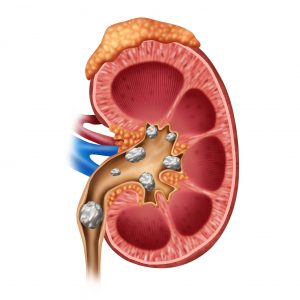 A study, undertaken by researchers at Duke Medicine and published in the journal Surgery, concluded that despite having an overall low risk profile, kidney stone treatment procedures do lead to secondary complications that require hospitalization or emergency care. In fact, one in every seven patients undergoing kidney stone treatment procedures had to be hospitalized because of complications after kidney stone removal.
A study, undertaken by researchers at Duke Medicine and published in the journal Surgery, concluded that despite having an overall low risk profile, kidney stone treatment procedures do lead to secondary complications that require hospitalization or emergency care. In fact, one in every seven patients undergoing kidney stone treatment procedures had to be hospitalized because of complications after kidney stone removal.
The worrisome aspect is that kidney stone complications, and these post-treatment complications can end up being a huge drain on the resources. Depending on the type of procedure and the subsequent post-operative care involved, the average costs could be in and around the $30,000 mark.
Advertisement
The lead author of the study Charles D. Scales Jr., MD, assistant professor of surgery at Duke, believes that the findings of their study should motivate the medical profession to determine why these complications are happening and find out ways and means to prevent them. This approach will help ease the burden on an already frail healthcare system.
As part of the study, Scales and his colleagues took a detailed look at the post-treatment outcomes of more than 93,000 privately insured patients who had undergone treatment for kidney stones. Among the treatments incorporated were ureteroscopy, shock wave lithotripsy, and percutaneous nephrolithotomy. These kidney stone procedures generate an estimated $10 billion annual tab in the United States.
Any visit to the hospital or emergency department within 30 days of the original procedure was taken as a post-treatment complication.
According to the study, procedures done at hospitals that performed high volumes of the procedure were much less likely to have complications. However, when complications occurred, they favored certain procedures more than the others.
Kidney stone complications: Know the facts
- Complications following shock wave lithotripsy -12 percent of patients
- Complications following uretroscopy -15 percent of patients
- Complications following nephrolithotomy -15 percent of patients
The cost of post-treatment complications also varied from procedure to procedure. The average costs for complications of nephron-lithotomy were over $47,000, costs for complications of shock wave lithotripsy were around $32,000, while the costs for complications of uretroscopy were a lot lower – around $13,000.
While Scales is convinced that more research needs to be done to understand the huge disparity between complication rates and costs, he is even more mindful that patients may be unprepared for complications arising from what they believe to be minimally invasive treatments.
For a patient, an unplanned visit or hospital admission after a supposedly low-risk procedure is a significant event, Scales said. The financial implications are huge as the patients not only face the cost of the treatment of the complication, but also have to bear the brunt of the implications that arise from time off work.
Advertisement
And to add to the drama, there are the public policy implications, particularly in the current environment where health costs are being scrutinized very closely.
Kidney stones treatment complications
Before undergoing any kidney stone procedure, however noninvasive or minimally invasive it may be, it is a good idea to talk to the surgeon of the post-operative complications linked to the procedure. While different kinds of treatment may have different complications, you need to know that the complications could also depend on size and position of your stones. The following is a list of complications that arise from kidney stone procedures:
- Sepsis – A jagged piece of stone could damage the lining of the urinary tract and cause an infection. This infection spreads through the blood, causing symptoms throughout the whole body
- Steinstrasse – A condition where fragments of the broken stone can get blocked in the ureter (the tube emptying out the urine that goes from each kidney into the bladder)
- An injury to the ureter
- Urinary tract infection (UTI)
- Post-operative bleeding
- Pain
The team doing the study believes that preventing these complications and reducing unplanned emergency visits and hospitalizations associated with kidney stone treatments could result in significant cost savings. And to further that cause, the team’s next step is to understand why these complications occur and what measures need to be taken to avoid said complications.
